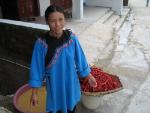- Getting around Lijiang. Dont stay in the Old Towns more than 2 days, there is nothing to do. KRISS Oct 9, 2013 05:46
- 2013 Beijing Temple Fair BENNYLAU Feb 26, 2013 03:29
- Malaysian traveling from KUL - LAX vis Shanghai PVG ZATI_DY Jan 3, 2013 20:15
<a>Guizhou: The Shui Cultural Center
- Views: 4917
- |Vote: 0 0
- |Add to Favorites
- |Recommend to Friends
Water People in Smalltown Guizhou
The Shui (water) people have an enigmatic history. Many believe they migrated from southeast China before the Han Dynasty, but some Shui people in Guizhou told me that their ancestors fled war-torn lands in the northwest and settled in the fertile river valleys of Guizhou. Whatever the case, the Shui people are now one of the poorest minorities in one of the poorest provinces in China. Traveling in Guizhou this summer, I made it out to some rural villages on a quest to find knowledge about the Shui culture.
The Shui speak their own language, and sometimes their Mandarin isn't very good. I talked to many people in the few villages I visited, and I could only understand a small amount of what they said. The people, who live towns with the better-known Buyi and Miao people, are friendly but seem somewhat guarded about their culture. Visitors must build good rapport before they can be welcomed into the village. Unlike many other Chinese minorities, they haven't yet learned to market their way of life to tourists on a large scale, and until they do, their economic situation probably won't improve much.
The Shui espouse many different legends and myths, and their culture is inextricably linked with the fish, which is said to have sustained them when they first migrated to the region. The fish is a symbol of life and abundance that has been deified in certain stories. To eat fish is to show good standing in the community, and fish is served at all ceremonies and important events.
But an inordinate emphasis on fish isn’t the only idiosyncrasy of the Shui people. They (especially older women) wear traditional clothing that looks almost like a uniform: bright blue tops with black bottoms, hair pulled up in buns on top of their heads and fastened with an ornate headdress. Women carry babies on their backs in small packs adorned with the ma wei shou, traditional horse-hair embroidery. When a women has a baby, its grandmother crafts this sling to keep the baby close to its mother and to ward off evil spirits.
Interestingly, families in most Shui settlements share the same surnames, which means there’ll sometimes be an entire town with the last name Zhang or Li. Because of the poverty in the villages, the government subsidizes Shui farming, and because there is rarely modern healthcare available, each village has its own medicine man that intercedes with unseen forces on behalf of the sick.
The Shui could definitely benefit from outside aide, but no one knows whether the government will lift its restrictions and allow charitable organizations to begin work there.
Interesting Shui proverb, as translated by a Chinese friend of mine:
“A wife without a husband is like a hat without a top, and a husband without a wife is like a horse without reins.” In other words, a woman is not fully functional without being attached to a man, and once the pact is made, the woman keeps the man grounded and level-headed.
You can find Shui people (as I did) in many of Guizhou’s smaller cities and towns: Pu An Zhen, Duyun, Sandong, Dayu, Duzhang, and most importantly Sandu, the capital of the Shui autonomous prefecture. In Sandu there is a library where you can research the Shui, complete with population statistics and cultural information. But if you’re a foreigner, be aware that the government does not want you snooping around. To witness Shui culture firsthand, you have to be willing to get kicked out of town. Having observed the marvelous culture of the Shui, I think it’s worth the risk.




 Copyright © 1998-2026 All rights reserved.
Copyright © 1998-2026 All rights reserved.
1.
Feb 2, 2007 16:04 Reply
ICTHUS17 said:
Well, I guess another, easier way to interpret it is to say that men and women complete each other. Neither serves their entire purpose without being yoked to the other. I think that's a good way to describe it.
2.
Feb 1, 2007 17:36 Reply
CHYNAGYRL said:
Hello. I like the proverb but are you sure they got it right??? I think: A man is not truly functional without a woman, and a woman needs a man to keep her grounded and level-headed. Women are more capricious than men in general... and well guys... can't function that well without a woman around. (^^)